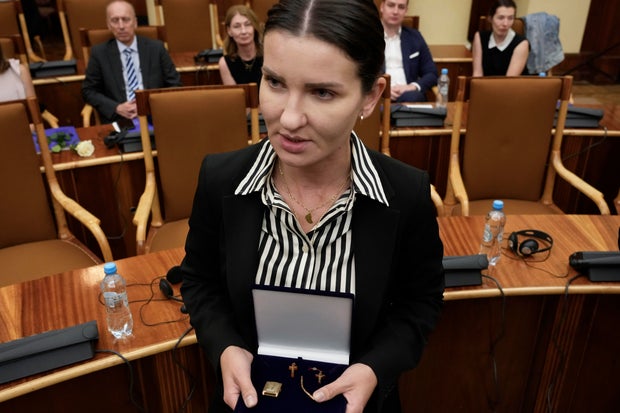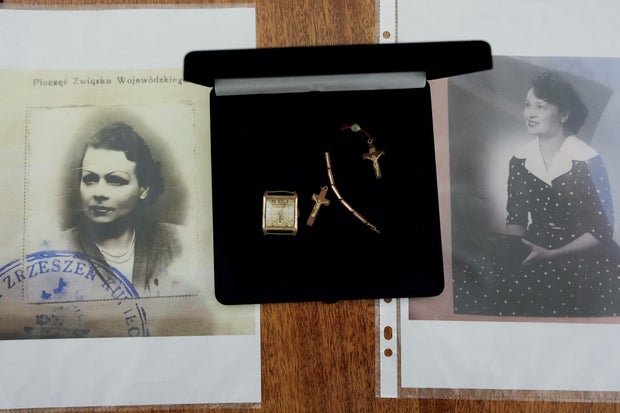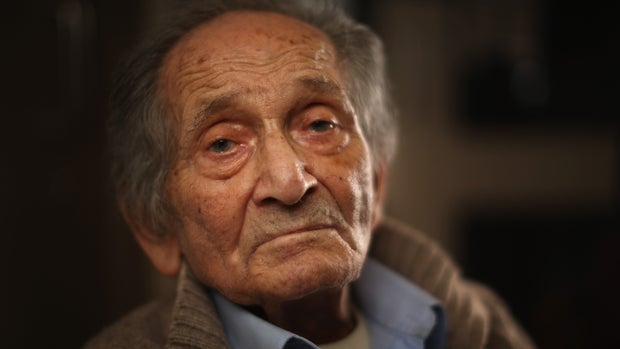CBS News
Jewelry seized by Nazis from concentration camp prisoners returned to families in Poland

Warsaw, Poland — Stanislawa Wasilewska was 42 when she was captured by Nazi German troops on Aug. 31, 1944 in Warsaw and sent to the women’s concentration camp at Ravensbrück. From there, she was sent to the Neuengamme forced labor camp, where she was given prisoner number 7257 and had her valuables seized.
Eighty years later, Germany’s Arolsen Archives returned Wasilewska’s jewelry to her grandson and great-granddaughter at an emotional ceremony in Warsaw during which families of 12 Polish inmates of Nazi concentration camps were given back their confiscated belongings.
Some relatives had tears in their eyes as they received the mementoes of their long-gone, often unknown family members. More such ceremonies are planned.
Wasilewska’s family were given back her two amber crucifixes, part of a golden bracelet and a gold wristwatch engraved with the initials KW and the date 7-3-1938, probably marking her wedding to Konstanty Wasilewski.
Czarek Sokolowski/AP
“This is an important moment in our lives, because this is a story that we did not fully know about and it came to light,” Wasilewska’s great-granddaughter, Malgorzata Koryś, 35, told The Associated Press.
When Nazi Germany was defeated in 1945, Wasilewska was taken by the Red Cross from Neuengamme to Sweden, but later returned to Poland. She is buried in her native Grodzisk Mazowiecki, near Warsaw.
From another family, Adam Wierzbicki, 29, was given two rings which belonged to Zofia Strusińska and a golden chain and tooth filling of Józefa Skórka, two married sisters of his great-grandfather Stanislaw Wierzbicki. Captured together on Aug. 4, like Wasilewska ,the sisters also went through Ravensbrück and Neuengamme before the Red Cross took them to Sweden.
A family story has it that a Swedish man fell in love with one of the sisters and wanted them both to stay, promising to take care of them, but they decided to go back to Poland, Wierzbicki said.
The return of their jewelry is “important for sentimental reasons but also for historical reasons,” Wierzbicki told the AP.
The items were returned by the Arolsen Archives, the international center on Nazi persecution, which holds information on about 17.5 million people. It stores some 2,000 items which were seized by the Nazis from concentration camp inmates from more than 30 countries, and are intended to be returned to their relatives.
Czarek Sokolowski/AP
When the prisoners were sent to concentration camps, their valuables — wedding rings, watches, gold chains, earrings and other items — were confiscated and put in envelopes marked with their owners’ names. That allowed for the items’ return to the families, decades later.
Countless other family treasures have been lost, however, including some valuables handed down through generations by former Nazi party members. Last year, the renowned auction house Christie’s cancelled the sale of a collection of jewels that had belonged to Austrian billionaire Heidi Horten after a report found her husband had been a Nazi party member and made his fortune under their rule.
It was an uplifting moment when the archives volunteers contacted him, Wierzbicki said, but there was also this thought that “history will catch up with you. It was like my aunts were looking at me from the past.”
The archives launched its restitution campaign, “Warsaw Uprising: 100 Untold Stories,” to mark 80 years since the city rose up against the Nazi invaders on Aug. 1, 1944, with the goal of reaching the families of 100 victims and reviving the memory of them through their belongings.
Archive director Floriane Azoulay said they were only custodians of the belongings, which should be returned to the families.
“Every object that we return is personal,” Azoulay said. “And it’s the last personal thing a person had on them before they became a prisoner, before they became a number. So it is a very important object for a family.”
Volunteer Manuela Golc has found more than 100 Polish families and each time it’s an emotional moment.
“It is often the case that we pass on information that the family was not aware of at all,” Golc said. “So this conversation on the phone … is also very difficult. But in the end we are very happy that the memento is returning to the family.”
If she was unable to trace a family online or through official records, she travelled to cemeteries, leaving notes waterproofed against the rain for the families on the graves of people whose data matched those in the archives, asking them to get in touch. Sometimes they do.
The Warsaw Uprising was launched by the underground resistance Home Army with the goal of taking control of the capital city ahead of the advancing Soviet troops. It fell after 63 days of heroic struggle that cost the lives of some 200,000 fighters and civilians. In revenge, the Germans expelled the surviving residents and reduced Warsaw to ruins.
During German occupation in 1939-45, Poland lost some 6 million residents, half of them Jewish, and suffered huge material losses.
CBS News
2 killed in U.S. Civil Air Patrol plane crash near Palisade Mountain in Northern Colorado

Two people were killed and a third was injured when a U.S. Civil Air Patrol plane crashed in Colorado’s Front Range Saturday morning.
The small passenger plane with three people aboard crashed near Storm Mountain and Palisade Mountain west of Loveland around 11:15 a.m., according to the Larimer County Sheriff’s Office. The plane belonged to the Civil Air Patrol, the civilian auxiliary wing of the U.S. Air Force, and was on a routine aerial photography training mission when it went down, officials said.
Pilot Susan Wolber and aerial photographer Jay Rhoten were identified by CAP as those killed and co-pilot Randall Settergren was identified as the person injured. Settergren was airlifted to an area hospital by a National Guard helicopter, where he is undergoing medical care.
CBS
“The volunteers of Civil Air Patrol are a valuable part of the Department of Military and Veterans Affairs, and the lifesaving work they do on a daily basis directly contributes to the public safety of Coloradans throughout the state,” Maj. Gen. Laura Clellan, adjutant general of the Colorado Department of Military and Veterans Affairs, said in a statement Saturday.
“We are devastated to hear of the loss of Susan Wolber and Jay Rhoten, and the injury of Randall Settergren, during a training mission in Larimer County. Our thoughts and deepest condolences are with the families of those involved in the crash,” Clellan continued. “I would also like to thank all of the first responders who assisted with rescue efforts.”
Palisade Mountain is in Larimer County, about 20 miles west of Loveland and about 65 miles northwest of Denver. The area is part of the burn scar of the Alexander Mountain Fire, which burned almost 10,000 acres in over two weeks this past summer.
The crash happened about 200 feet below the summit of Palisade Mountain in an area that includes tall trees and steep hills as part of the mountain range. Rescue crews were heard on radio traffic working to find a landing zone for rescue helicopters. No structures were impacted by the crash.
The plane crashed in “very rugged” and “extensive and rocky terrain,” Ali Adams, a Larimer County Sheriff’s Office spokeswoman, said at a news conference. First responders had to hike out to the site and the sole survivor was “severely injured” when responders finally got to them.
Rescue efforts were ongoing at 3:15 p.m., according to Adams, and recovery efforts for the two deceased people’s bodies could take several days.
Several agencies responded, including the Loveland Fire Rescue Authority, Thompson Valley EMS and the National Guard.
The Larimer County Sheriff’s Office is the lead agency investigating the crash and the Federal Aviation Administration and National Transportation Safety Board will assist, according to Adams. The NTSB said it too was investigating the crash and identified the plane as a Cessna 182.
“This is one of those incidents that is really low frequency; it doesn’t happen really often, but unfortunately, our first responders have had more than their fair share of responses,” Adams said.
George Solheim lives in the area of the crash. He described conditions as “extremely windy” on Saturday and heard the plane just prior to the crash. He says he could hear “loud ‘throttle up/down’ immediately prior to sudden silence at (the) time of (the) crash. Couldn’t hear sounds of impact from here.”
Colorado Gov. Jared Polis extended his sympathy to the families of the victims in a statement Saturday evening:
“I’m saddened to hear of the loss of two dedicated Civil Air Patrol members, Pilot Susan Wolber and aerial photographer Jay Rhoten, who lost their lives in today’s crash and my thoughts are with their families, friends and colleagues. These individuals, along with survivor co-pilot Randall Settergren, who was injured, served the Civil Air Patrol as volunteers who wanted to help make Colorado a better, safer place for all. The State of Colorado is grateful for their commitment to service and it will not be forgotten. I also want to thank the first responders who assisted with the rescue and recovery efforts.”
CBS News
Fred Harris, former Democratic U.S. senator and presidential candidate, dies at 94

Fred Harris, a former U.S. senator from Oklahoma, presidential hopeful and populist who championed Democratic Party reforms in the turbulent 1960s, died Saturday. He was 94.
Harris’ wife, Margaret Elliston, confirmed his death to The Associated Press. He had lived in New Mexico since 1976.
“Fred Harris passed peacefully early this morning of natural causes. He was 94. He was a wonderful and beloved man. His memory is a blessing,” Elliston said in a text message.
Bettmann Archive/Getty Images
Harris served eight years in the Senate, first winning in 1964 to fill a vacancy, and made unsuccessful bid for the presidency in 1976.
“I am deeply saddened to learn of the passing of my longtime friend Fred Harris today,” Democratic New Mexico Gov. Michelle Lujan Grisham wrote in a post to social media. “Harris was a towering presence in politics and in academia, and his work over many decades improved New Mexico and the nation. He will be greatly missed.”
Democratic Sen. Martin Heinrich of New Mexico said in a statement that “New Mexico and our nation have lost a giant,” describing him as a “tireless champion of civil rights, tribal sovereignty and working families.”
It fell to Harris, as chairman of the Democratic National Committee in 1969 and 1970, to help heal the party’s wounds from the tumultuous national convention in 1968 when protesters and police clashed in Chicago.
He ushered in rule changes that led to more women and minorities as convention delegates and in leadership positions.
“I think it’s worked wonderfully,” Harris recalled in 2004, when he was a delegate to the Democratic National Convention in Boston. “It’s made the selection much more legitimate and democratic.”
“The Democratic Party was not democratic, and many of the delegations were pretty much boss-controlled or -dominated. And in the South, there was terrible discrimination against African Americans,” he said.
Harris ran unsuccessfully for the Democratic presidential nomination in 1976, quitting after poor showings in early contests, including a fourth-place win in New Hampshire. The more moderate Jimmy Carter went on to win the presidency.
Harris moved to New Mexico that year and became a political science professor at the University of New Mexico. He wrote and edited more than a dozen books, mostly on politics and Congress. In 1999 he broadened his writings with a mystery set in Depression-era Oklahoma.
Throughout his political career, Harris was a leading liberal voice for civil rights and anti-poverty programs to help minorities and the disadvantaged. Along with his first wife, LaDonna, a Comanche, he also was active in Native American issues.
“I’ve always called myself a populist or progressive,” Harris said in a 1998 interview. “I’m against concentrated power. I don’t like the power of money in politics. I think we ought to have programs for the middle class and working class.”
“Today ‘populism’ is often a dirty word because of how certain leaders wield power,” Heinrich said in his statement Saturday. “But Fred represented a different brand of populism — one that was never mean or exclusionary. Instead, Fred focused his work and attention on regular people who are often overlooked by the political class.”
Harris was a member of the National Advisory Commission on Civil Disorders, the so-called Kerner Commission, appointed by then-President Lyndon Johnson to investigate the urban riots of the late 1960s.
The commission’s groundbreaking report in 1968 declared, “our nation is moving toward two societies, one black, one white — separate and unequal.”
Thirty years later, Harris co-wrote a report that concluded the commission’s “prophecy has come to pass.”
“The rich are getting richer, the poor are getting poorer and minorities are suffering disproportionately,” said the report by Harris and Lynn A. Curtis, president of the Milton S. Eisenhower Foundation, which continued the work of the commission.
Norman Ornstein of the American Enterprise Institute said Harris rose to prominence in Congress as a “fiery populist.”
“That resonates with people…the notion of the average person against the elite,” Ornstein said. “Fred Harris had a real ability to articulate those concerns, particularly of the downtrodden.”
In 1968, Harris served as co-chairman of the presidential campaign of then-Vice President Hubert Humphrey. He and others pressed Humphrey to use the convention to break with Johnson on the Vietnam War. But Humphrey waited to do so until late in the campaign, and narrowly lost to Republican Richard Nixon.
“That was the worst year of my life, ’68. We had Dr. Martin Luther King killed. We had my Senate seatmate Robert Kennedy killed and then we had this terrible convention,” Harris said in 1996.
“I left the convention — because of the terrible disorders and the way they had been handled and the failure to adopt a new peace platform — really downhearted.”
After assuming the Democratic Party leadership post, Harris appointed commissions that recommended reforms in the procedures for selecting delegates and presidential nominees. While lauding the greater openness and diversity, he said there had been a side effect: “It’s much to the good. But the one result of it is that conventions today are ratifying conventions. So it’s hard to make them interesting.”
“My own thought is they ought to be shortened to a couple of days. But they are still worth having, I think, as a way to adopt a platform, as a kind of pep rally, as a way to get people together in a kind of coalition-building,” he said.
Harris was born Nov. 13, 1930, in a two-room farmhouse near Walters, in southwestern Oklahoma, about 15 miles from the Texas line. The home had no electricity, indoor toilet or running water.
At age 5 he was working on the farm and received 10 cents a day to drive a horse in circles to supply power for a hay bailer.
He worked part-time as a janitor and printer’s assistant to help for his education at University of Oklahoma. He earned a bachelor’s degree in 1952, majoring in political science and history. He received a law degree from the University of Oklahoma in 1954, and then moved to Lawton to practice.
In 1956, he won election to the Oklahoma state Senate and served for eight years. In 1964, he launched his career in national politics in the race to replace Sen. Robert S. Kerr, who died in January 1963.
Harris won the Democratic nomination in a runoff election against J. Howard Edmondson, who left the governorship to fill Kerr’s vacancy until the next election. In the general election, Harris defeated an Oklahoma sports legend — Charles “Bud” Wilkinson, who had coached OU football for 17 years.
Harris won a six-year term in 1966 but left the Senate in 1972 when there were doubts that he, as a left-leaning Democrat, could win reelection.
Harris married his high school sweetheart, LaDonna Vita Crawford, in 1949, and had three children, Kathryn, Byron and Laura. After the couple divorced, Harris married Margaret Elliston in 1983. A complete list of survivors was not immediately available Saturday.
CBS News
Compromise deal reached at COP29 climate talks for $300 billion a year to poor nations

Countries agreed on a deal to inject at least $300 billion annually in humanity’s fight against climate change, aimed at helping poor nations cope with the ravages of global warming at tense United Nations climate talks in the city where industry first tapped oil.
The $300 billion will go to developing countries who need the cash to wean themselves off the coal, oil and gas that causes the globe to overheat, adapt to future warming and pay for the damage caused by climate change’s extreme weather. It’s not near the full amount of $1.3 trillion that developing countries were asking for, but it’s three times the $100 billion a year deal from 2009 that is expiring. Delegations said this deal is headed in the right direction, with hopes that more money flows in the future.
“Everybody is committed to having an agreement,” Fiji delegation chief Biman Prasad said as the deal was being finalized. “They are not necessarily happy about everything, but the bottom line is everybody wants a good agreement.”
It’s also a critical step toward helping countries on the receiving end create more ambitious targets to limit or cut emissions of heat-trapping gases that are due early next year. It’s part of the plan to keep cutting pollution with new targets every five years, which the world agreed to at the U.N. talks in Paris in 2015.
The Paris agreement set the system of regular ratcheting up climate fighting ambition as away to keep warming under 1.5 degrees Celsius above pre-industrial levels. The world is already at 1.3 degrees Celsius and carbon emissions keep rising.
Countries also anticipate that this deal will send signals that help drive funding from other sources, like multilateral development banks and private sources. That was always part of the discussion at these talks — rich countries didn’t think it was realistic to only rely on public funding sources — but poor countries worried that if the money came in loans instead of grants, it would send them sliding further backward into debt that they already struggle with.
“The $300 billion goal is not enough, but is an important down payment toward a safer, more equitable future,” said World Resources Institute President Ani Dasgupta. “This deal gets us off the starting block. Now the race is on to raise much more climate finance from a range of public and private sources, putting the whole financial system to work behind developing countries’ transitions.”
It’s more than the $250 billion that was on the table in the first draft of the text, which outraged many countries and led to a period of frustration and stalling over the final hours of the summit. After an initial proposal of $250 billion a year was soundly rejected, the Azerbaijan presidency brewed up a new rough draft of $300 billion, that was never formally presented, but also dismissed roundly by African nations and small island states, according to messages relayed from inside.
The several different texts adopted early Sunday morning included a vague but not specific reference to last year’s Global Stocktake approved in Dubai. Last year there was a battle about first-of-its-kind language on getting rid of the oil, coal and natural gas, but instead it called for a transition away from fossil fuels. The latest talks only referred to the Dubai deal, but did not explicitly repeat the call for a transition away from fossil fuels.
Countries also agreed on the adoption of Article 6, creating markets to trade carbon pollution rights, an idea that was set up as part of the 2015 Paris Agreement to help nations work together to reduce climate-causing pollution. Part of that was a system of carbon credits, allowing nations to put planet-warming gasses in the air if they offset emissions elsewhere. Supporters said a U.N.-backed market could generate up to an additional $250 billion a year in climate financial aid.
Despite its approval, carbon markets remain a contentious plan because many experts say the new rules adopted don’t prevent misuse, don’t work and give big polluters an excuse to continue spewing emissions.
“What they’ve done essentially is undermine the mandate to try to reach 1.5,” said Tamara Gilbertson, climate justice program coordinator with the Indigenous Environmental Network. Greenpeace’s An Lambrechts, called it a “climate scam” with many loopholes.
With this deal wrapped up as crews dismantle the temporary venue, many have eyes on next year’s climate talks in Belem, Brazil.












